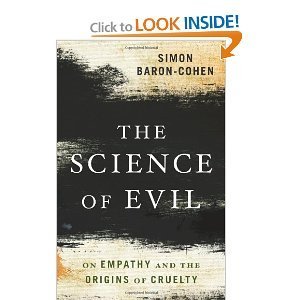Evil!
The Science of Evil by Simon Baron-Cohen
 Some folks may recognize Simon Baron-Cohen (uncle of Sasha Baron-Cohen, better known as Borat) from his research into autism. Speaking very broadly, Baron-Cohen believes that the causes of autism are rooted in gender differences, namely the disparity between the degrees of empathy that either gender is capable of experiencing. Empthy is the key word here, because while the title of this book might suggest something of a more philosophical nature–think Sam Harris' The Moral Landscape–what you really have is a very cut-and-dry investigation into what empathy actually is, its neurological underpinnings, and what could happen when those underpinnings fail.
Some folks may recognize Simon Baron-Cohen (uncle of Sasha Baron-Cohen, better known as Borat) from his research into autism. Speaking very broadly, Baron-Cohen believes that the causes of autism are rooted in gender differences, namely the disparity between the degrees of empathy that either gender is capable of experiencing. Empthy is the key word here, because while the title of this book might suggest something of a more philosophical nature–think Sam Harris' The Moral Landscape–what you really have is a very cut-and-dry investigation into what empathy actually is, its neurological underpinnings, and what could happen when those underpinnings fail.
Interestingly, the author's theories regarding psychopathy–largely the focus here–stem from his research into autism. Baron-Cohen maintains that folks at the severe end of the autism spectrum and folks who fit the clinical definition of "psychopaths" are often joined by a lack of empathy. That is, they are unable to grasp the concept of others' feelings and wants. In some cases, this is "balanced out" by a greater-than-average propensity for systematization, as well as an ability to spot patterns that most folks overlook–what Baron-Cohen calls Zero Positive empathy, otherwise known as the autism spectrum–while other times this lack of empathy leads to a view of other people as "things" whose sole existence is to facilitate the wants and needs of the individual–what Baron-Cohen calls Zero Negative empathy, and which he says is a major cause of severe cruelty.
This is fascintating stuff for the armchair psychologist in most of us, though the writing itself could use some work. Not that most of us expect general-audience nonfiction to be necessarily Shakespearian, but we do usually expect some degree of style and fluidity that, in this case, just isn't here. And this in itself might not be a problem, were it not for the fact that it contributes to an oversimplification of many important concepts–for example, the very concept of "evil." Baron-Cohen addresses it at the beginning of the book and makes it clear that he believes the typical religious conception to be inadequate, but to attribute such a complex concept to little more than "a lack of empathy," as he does, doesn't seem much better. And yes, I realize that he's not writing some treatise on moral philosophy but rather a succint overview of a very complex psycho-biological matter. But it does seem that even this kind of work demands a more thorough investigation into what "evil" actually means, perhaps because of how easily a statement like this opens itself to so many fickle philosophical objections (Aren't people objects? Couldn't we say that we do, in fact, treat everyone like an object in some form? How are humans supposed to be treated?). Another part of it just that this seems to let "evil" off the hook a bit too easily; Baron-Cohen illustrates his conception of evil by referencing the Nazis, but there's something just a bit heartless and obtuse about implying that all the Nazis really did was treat people like objects.
 Still, this doesn't diminish the book's overall impact. At the end of the day, you still have a thoroughly scientific perspective on an issue that most folks are content to chalk up to a Michael Bayish notion of "good vs. evil." To look at concepts like cruelty with a scientific eye requires us to set aside some of our most long-standing beliefs. This is no easy feat, but at the very least, Simon Baron-Cohen provides us with a good entry point.
Still, this doesn't diminish the book's overall impact. At the end of the day, you still have a thoroughly scientific perspective on an issue that most folks are content to chalk up to a Michael Bayish notion of "good vs. evil." To look at concepts like cruelty with a scientific eye requires us to set aside some of our most long-standing beliefs. This is no easy feat, but at the very least, Simon Baron-Cohen provides us with a good entry point.











